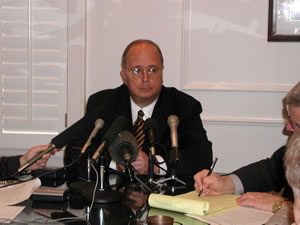In order to provide equal access and equal opportunity to people with diverse abilities, this site has been designed with accessibility in mind. Click here to view
Senate Leader Taylor Proposes "Texas Plan" on Taxes, Will Ask Voters to Approve Lone Star State Tax Code
 Senator Taylor discusses the Texas Plan with reporters at his State Capitol news conference.
Senator Taylor discusses the Texas Plan with reporters at his State Capitol news conference.
The leader of the Oklahoma State Senate wants voters to decide whether Oklahoma should scrap its current tax system and replace it with the one used by Texas - a state that has no income tax or sales tax on groceries.
Senate President Pro Tempore Stratton Taylor has proposed drafting what he calls the "Texas Plan" - a series of constitutional amendments and statutes that would allow Oklahoma to adopt an identical replica of the Texas tax system.
"Instead of just trimming around the edges of our tax system, we need to consider a much bolder approach. We've heard a lot of talk about how much more business and people friendly the Texas tax system is. I think we owe it to voters to give them an opportunity to decide whether it's right for them. I'm sure Oklahomans would jump at the chance to eliminate the income tax and the sales tax on groceries," said Senator Taylor.
Under the proposal, academic leaders at the University of Oklahoma and Oklahoma State University would be tapped to help research and draft the "Texas Plan." Their examinations would focus on the states' respective tax codes, including personal and corporate income tax, sales taxes and exemptions, property taxes, estate taxes, franchise taxes and other business taxes.
"By turning the project over to the universities, we can take politics out of the mix and examine the proposal on its merits alone," noted Taylor.
After university officials complete their research and draft a proposed Oklahoma version of the Texas tax code, the package would be forwarded to the Legislature for approval and ultimately placed on a statewide ballot for Oklahoma voters to decide. Although it might take several
constitutional amendments and statutory changes to implement the tax switch, all would have to be approved for the program to become law.
"I think it's important to consider the Texas tax code in its entirety. If we don't consider a uniform adoption of every aspect of the Texas system, we might miss out on some potential benefits for Oklahoma," said Taylor.
"Certainly, the sales tax exemption on groceries is a perfect example. In Oklahoma, we're now talking about doing away with just the state's take of the sales tax on groceries. In Texas, groceries are exempt from all levels of taxation - state, county and municipal. Under the Texas Plan, Oklahoma would get a true removal of the sales tax on groceries rather than a piecemeal approach. Think of it. In many Oklahoma communities that would mean a 10 percent reduction in grocery bills."
Public input is the most critical aspect of the "Texas Plan," according to the legislative leader. He noted that last year citizens overwhelmingly approved the overhaul of the state's motor vehicle tax system, passing the proposal with 80 percent of the vote. Taylor wants to give them the same opportunity on the Texas tax code.
"We gave voters a chance to speak their minds on tags. We should give them a chance to have their say on Texas taxes as well. They can compare the two tax codes, consider their individual situations and decide what is best for the state," said Taylor.
The Senate leader is optimistic that the two universities can do the necessary tax research and draft a proposal in time for the Legislature to consider the issue before it adjourns at the end of May. The proposed constitutional amendments would then be placed on a special election ballot in the near future.
"I think the universities can do the leg work pretty quickly, certainly in enough time to pass the measure this legislative session. The quicker we can give voters an opportunity to decide this question, the better," said Taylor.
 Oklahoma Senate
Oklahoma Senate

